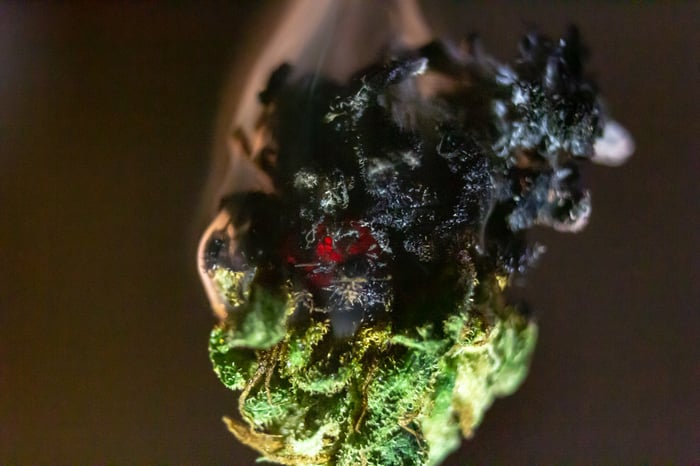Although all eyes are on tech, it's cannabis that could turn out to be one of the greatest growth stories of the decade. Estimates from New Frontier Data suggest that marijuana sales in the U.S. can grow by an annualized rate of 21% between 2019 and 2025. If accurate, this would place annual pot sales in the largest marijuana market in the world at $41.5 billion by 2025.
Meanwhile, BDSA believes Canadian weed sales can more than double by 2026 to $6.4 billion. This would be the result of supply chains becoming more efficient and more retail locations opening in populated provinces, such as Ontario.

Image source: Getty Images.
Pot stock Sundial Growers has become a millennial favorite
As impressive as this growth trajectory is, investors -- especially young ones -- continue to gravitate toward the worst possible companies in the cannabis space. One they're specifically attracted to is Canadian licensed producer Sundial Growers (SNDL 2.19%).
Sundial has become a favorite among millennials and new investors for a variety of reasons. First, it's cannabis. Polling shows that favorability toward legalizing marijuana increases as age decreases. In Gallup's 2020 survey, a record 68% of respondents favored legalizing weed. However, favorability among those aged 18 to 29 was 79%.
Sundial is also a highly liquid penny stock, and that's long been a formula to attract traders and young investors. Though it's an incorrect assumption, new investors often believe that low-priced stocks have a better chance of yielding game-changing returns than companies with, say, triple-digit share prices.
What's more, Sundial Growers has been one of the most popular companies caught up in the Reddit frenzy. Without (pardon the pun) getting too far into the weeds, retail investors on Reddit's WallStreetBets chatroom have been banding together to buy shares and out-of-the-money call options in stocks that are heavily sold short, with the purpose of effecting a short squeeze. Sundial is one of the most heavily shorted public companies at the moment.

Image source: Getty Images.
Sundial's own management team is sounding the alarm
While young investors have cobbled together a handful of reasons to support Sundial Growers, the company's operating performance and balance sheet have suggested it's a stock to avoid at all costs. In fact, even Sundial's own management team is sounding warnings in its latest prospectus.
On Monday, March 22, Sundial filed a prospectus with the Securities and Exchange Commission outlining that up to $800 million worth of its common stock may be sold via at-the-market (ATM) offerings. If fully executed at $1.54 a share (the company's closing price on March 17), it would have almost 2.18 billion shares outstanding.
I've sounded the alarm on Sundial on numerous occasions. Now, its management team is doing so, as well.

Image source: Getty Images.
1. Sundial's recent share-price appreciation makes no fundamental sense
To begin with, the second paragraph of the prospectus states the following:
Other than as described in our annual report on Form 20-F for the year ended December 31, 2020, filed with the Securities and Exchange Commission (the "SEC") on March 17, 2021, there has been no recent change in our financial condition or results of operations, such as our earnings, revenues, or other measure of company value that is consistent with the recent change in, and volatility of, our share price.
In other words, management is letting current and prospective investors know immediately that there's no reason they can think of why Sundial's stock gained approximately 1,000% in less than six months. This is a company that's shifting from a wholesale cannabis model to retail and is therefore going to have to rebuild its brand from the ground up. In terms of sales growth, Sundial is practically bringing up the caboose throughout North America.

Image source: Getty Images.
2. "There is no minimum or maximum sales price"
Among the risk factors associated with Sundial's ATM offering, the prospectus had this to say:
Investors who purchase common shares in this offering at different times will likely pay different prices, and so may experience different outcomes in their investment results. We will have discretion, subject to market demand, to vary the timing, prices, and number of shares sold, and there is no minimum or maximum sales price. Investors may experience a decline in the value of their shares as a result of share sales made at prices lower than the prices they paid.
This mouthful of a statement is a roundabout way of warning investors that share-based dilution bears risk. The company flat out told investors that its increase in market cap makes no sense given the lack of change in its operating results. This means there shouldn't be a material change in its market cap, even with up to $800 million in common stock being sold. In other words, if you keep buying or holding shares of Sundial, there's a good chance the additional stock being offered will drag down the company's share price.
What's more, the prospectus is clear that there's no minimum or maximum sales price. This should cap any upside momentum in the stock and potentially pulverize shareholders if Sundial chooses to sell shares significantly lower than the current price.

Image source: Getty Images.
3. How management uses this cash is anyone's guess
Also among the risk factors, the prospectus outlines management's discretion in putting its raised capital to work:
Our management will have broad discretion in the application of the net proceeds from the offering and could spend the proceeds in ways that do not improve our results of operations or enhance the value of our common shares. The failure by management to apply these funds effectively could result in financial losses that could have a material adverse effect on our business and cause the price of our common shares to decline. Pending their use, we may invest the net proceeds from the offering in a manner that does not produce income or that loses value.
Even though this is more of a generalized risk statement that would be found in most ATM-offering prospectuses, it's difficult to overlook this statement when Sundial's management team really doesn't have a cohesive plan.
Based on the 1.15 billion shares the company has issued in six months, it would appear that management is turning Sundial into some form of marijuana-focused Special Purpose Acquisition Company, or SPAC. But without any concrete plans, and with the understanding that Canadian marijuana stocks have a poor history when it comes to dealmaking, it's quite the leap to assume management will use this capital wisely.
If you subtract the $719 million Canadian in cash that Sundial has on hand ($575 million U.S.), investors are paying almost $1.6 billion for a company that's projected to generate only $56 million in full-year sales in 2021 and isn't profitable. By comparison, investors can buy into pot stocks right now with lower market caps that offer considerably higher sales and should turn the corner to profitability in 2021.
It's a no-brainer: Sundial is the worst pot stock money can buy.





